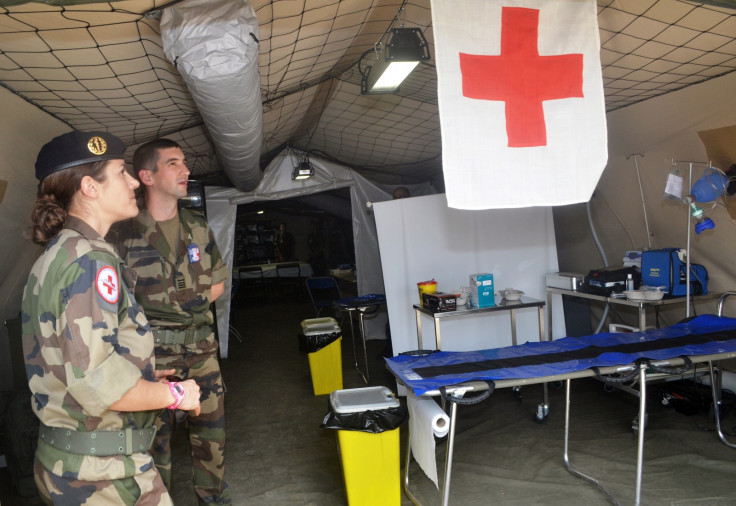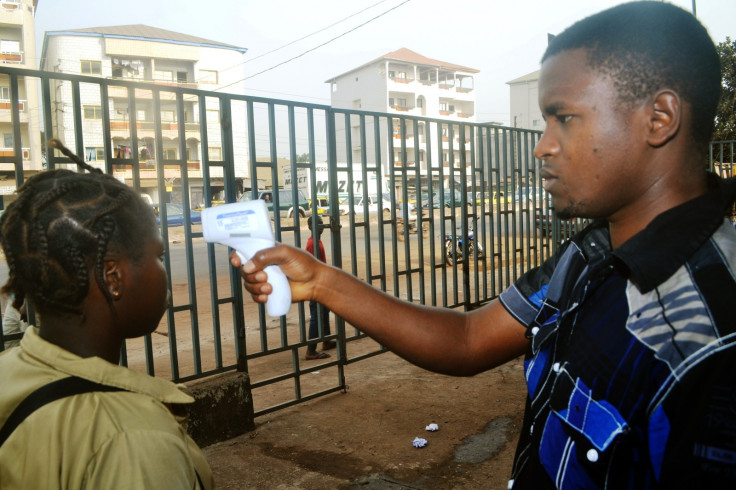Ebola Crisis: Red Cross workers attacked as virus conspiracies create panic in Guinea

Ebola health workers have been the victims of mob attacks across Guinea caused by false rumours spread by opposition politicians , international NGOs exclusively claimed to IBTimes UK.
The latest of these rumours - that the Red Cross was intentionally spraying schoolchildren with the virus - spread chaos in the capital Conakry and the region of Faranah last week, resulting in violent attacks against the organisation workers.
On 19 February, the Prefect of Faranah, Kennett Guilavogui, announced seven people had been arrested for the dissemination of rumours and false or misleading news.
While the identities of the suspects are still unknown, Guilavogui said that they would soon go on trial. The Prefect added more arrests would follow.
"One can not accept that individuals may inform parents that schools are about to administer the virus to their children, " she said in a statement.
Local Journalist, Macky Sow told IBTimes UK: "It is very difficult to prove these rumours are spread for political reasons, but there are many people who claim politicians are behind these rumours."
These attacks have hampered the health team's efforts to combat the spread of the virus, which the political opposition is blaming on the government ahead of upcoming elections, Youssouf Traoré, president for the Red Cross Society of Guinea, told IBTimes UK from Conakry.
"It must be understood that this year is an electoral year: the opposition never wants the happiness of the population, especially in Africa. We must think about all kind of things. Why are we not at the end of Ebola? Every time it seems Ebola is retreating, it comes back," Traoré said.
The country will be returning to the polls later this year, just five years after its first free elections.
The current President and leader of the socialist Rally of the Guinean People (RPG), Alpha Condé, will face Cellou Dalein Diallo, opposition leader for the liberal Union of Democratic Forces of Guinea (UFDG).
The opposition has denied the claims in a comment to IBTimes UK.
"These accusations are far from the truth. The opposition in general, and the UFDG particularly have never and will never take part in such actions against health workers," a spokesperson for the party said.
Meanwhile, the UFDG claims President Alpha Condé "was the first one to deny the danger of Ebola and he publicly accused international health organizations of taking part [in] a fear mongering campaign".
"The truth is, the government have failed controlling the disease and the mistrust of the population is from the mismanagement of this disease by our administration".
Power struggle
Guinea is facing a power struggle between opposition and the existing political power, with regular demonstrations for both sides taking place around the country.
On 17 January, Diallo - who stood for the party in the 2010 presidential election topping the poll in the first round - called his supporters for "civil disobedience" and continuing street protests against the current government, adding he saw no policy of appeasement coming from the Presidential ranks ahead of votes planned this year.
During a visit to Washington, Diallo, an economist and former prime minister from 2004 to 2006, claimed mismanagement of Guinea's response to the Ebola epidemic will hurt the nation's economy by hindering future investment.
Several US companies are active in the mining and aluminium ore production sectors, which provide about 80% of Guinea's foreign exchange, alongside diamonds and gold.
The nation's ambassador to the US, Mamady Condé, dismissed Diallo's comments as election-year rhetoric.
"We really hope all political leaders in our country and around the world be in solidarity in the fight against Ebola," the ambassador told Bloomberg recently. "We do not think this is a moment for any argument around the way this epidemic has been handled."
False rumours
"Here we have people of bad character who don't want us to get over with this epidemic, who don't want us to control it," Traoré said.
"We've had the epidemic for a year, and now that it is getting under control, dishonest people are lying to the population, telling them that the Red Cross is engaged in a campaign of pulverisation of the schools," he said, referring to the latest hearsay in the country.
"The population, being so traumatised by the epidemic, panicked as soon as they heard about the rumour. Every family, every parent of pupils went to pick up their kid from the schools. The whole capital panicked, which led to the attack," said Traoré.
Up to six schools in the capital were in a state of total panic.
Following the wave of panic, the Red Cross's headquarters in Conakry was attacked, before the police intervened.
"What is more paradoxical is that the Red Cross was first mentioned [in the rumours]– so someone used our name to create this panic within schools," Traoré said.

Hampering the fight
Almost simultaneously, mobs carried out another attack on the Red Cross' regional office 365km (227 miles) from the capital. "All our working equipment was looted," Traoré said.
This comes despite extensive information campaigns put out by the government and all health professionals involved.
"Paradoxically, people who have no access to the television, radio or the internet are staying in line, while people [from] localities with access to real information are turning against us.
"Everyone should ask themselves, why? We've done all we could [information-wise], yet those rumours spread in localities near Conakry, [where people] have access to all the information."
This, Traoré says, is hampering the fight against the virus.
"They are throwing spanners in our wheels - by preventing us access to certain communities, or contamination nests."
In January, President Condé authorised "the use of the police to arrest recalcitrants" in the fight against Ebola, after he claimed "there are people who do not want Ebola to end".
In September , eight health care workers and local journalists travelling to raise awareness about the spread of Ebola were killed in a massacre in the town of Womey.
Local journalist Sow, said: "At the time, many sources on the ground said that politicians were behind the massacre. But this is very difficult to prove. Many people are very reluctant to share this type of information."
Organised attacks
Claudia Evers, Médecins Sans Frontières's Ebola emergency coordinator in Guinea, echoed Traoré's claims, adding the attacks are more organised now that they have been in the past.
"We've had incidents since the beginning of Ebola, but these were more or less sporadic, and we could control them, and identify the different people in the communities who were behind the incidents."
Despite the latest press conference, she explains a group of youths attacked one of the local MSF sites, throwing stones on the building and destroying plastic shelters.
"Unfortunately we had four staff on the site. They had to hide in the building but managed to flee the site. Even then, the youths continued to demolish the building and they burnt our car," Evers said.
"We have not seen these kind of incidents, and the strength of these incidents, before. We are on high alert because it's the first time that it was clearly an organised attack."
"The [school] rumour spread at exactly the same moment this month, and this is more organised, prefecture by prefecture. It was in Conakry, Dabola, Kindia and Faranah," she explains, adding: "Of course, it is [an] election year but we cannot say it's one person because we have no proof. But it is clear it is election year."
Evers continued: "At the moment, we need to continue our work but it is becoming more difficult day-to-day - but on the other hand we cannot sacrifice beneficiaries due to this conflict either."
The past several weeks have seen an overall decrease in the number of cases, though there are still localised spikes and new outbreaks in prefectures that had been previously cleared, including prefectures in the north of the country - Mali and Togue.
The current outbreak in west Africa started in Guinea in March, 2014. There have been 3,120 cases and 2,072 deaths (as of 20 February 2015), making it the largest and most complex Ebola outbreak since the virus was first discovered in 1976.
Guinea is the country with the highest fatality rate, 63%, compared to Liberia (43%) and Sierra Leone (30%).
Guinea's election was called for October 2015 but the opposition have disputed the timetable.
© Copyright IBTimes 2024. All rights reserved.






